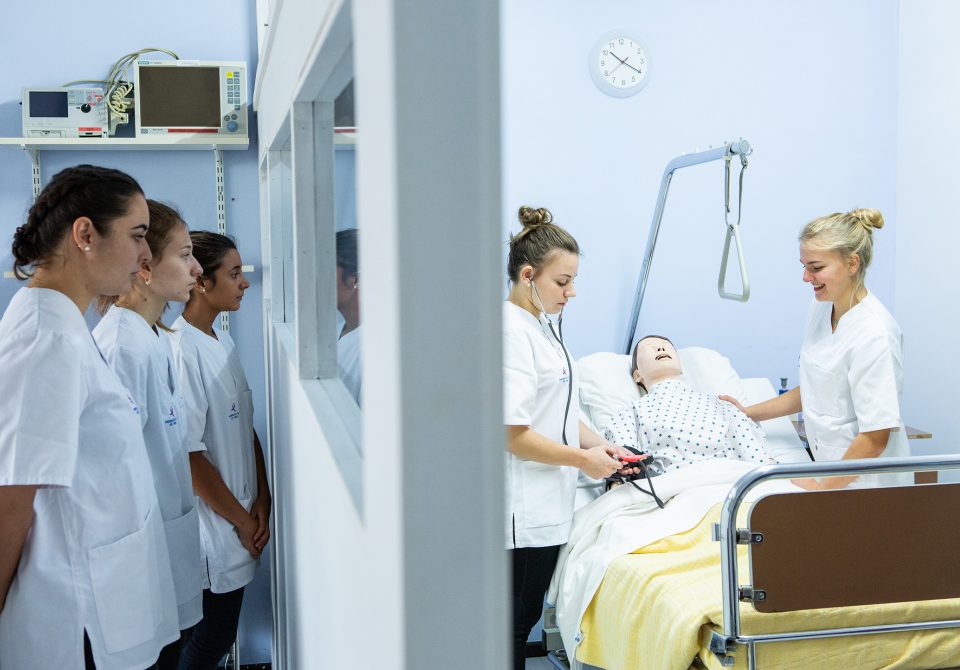
In brief
An active profession in need of nurses who love the richness of human contact
The strengths of the Bachelor: Nurse Responsible for General Care
- Personalised support, from teaching staff, and in close liaison with the host team for students on work placement. The learning objective is to improve students’ self-reflective skills and proficiency with the relevant technologies.
- Your Bachelor entitles you to study a one-year advanced programme at the University College Léonard de Vinci at the Woluwe site (Paediatrics and Neonatology, Perioperative Care, Community Health, Mental Health and Psychiatry, Intensive Care and Emergency Medical Aid, Oncology, Anaesthesia, Geriatrics and Psycho-Geriatrics).
- Furthering your skills after your Bachelor is also possible by doing a Master in Sciences for Clinical Nursing (120 credits – course in development), in collaboration with the UCLouvain. This Master is open to holders of the Bachelor in Nursing who would like to develop expertise in a particular field and improve their skills in scientific research, staying in touch with new knowledge and clinical leadership.
Good to know
You can choose between two locations: the Woluwe campus (Brussels) or the Louvain-la-Neuve campus. The programme of study is identical. Certain learning activities common to the whole department take place on either one site or the other
A career as a Nurse Responsible for General Care
The general care nurse is a versatile health professional. With official recognition as the ‘art infirmier’ (nursing profession), nursing is governed and protected by both a professional deontology and various royal decrees.
Putting the person at the centre of their work, the nurse provides a range of types of care with the aim of improving health and wellbeing at all stages of a person’s life. Either alone of within an interdisciplinary team, the nurse draws up care plans for which they have responsibility. Nurses support patients and their families in the respect of their personal and cultural dimensions. Nursing practice is based on the scientific method, that is, up-to-date and validated science.
The nursing profession is diverse and nurses are in short supply. As a health care professional, nurses practice in a range of health care settings (hospital or community based), in preventive medicine (PMS (Health Maintenance Programme, family planning, PSE (promoting health at school), in education (school medicine, occupational health…) or humanitarian work.
The Programme of Study
Programme4 years - 240 credits
Graduates are awarded a vocational Bachelor which enables them to enter the world of work[RAC1] directly.
The programme has 4 strands:
- A ‘Systems and the context of health care’ strand covers the full contextual spectrum: political, economic, social, cultural, legal, ethical and health promotion contexts in which practitioners operate and in which people and their families live.
- A ‘Professional development’ strand covers skills in research, clinical reasoning, self-self-reflectiveness and professional identity.
- A ‘Communication’ strand which studies the process of interaction with the patient and their family, as well as with the rest of the professional community (management, leadership, delegation).
- A ‘Support and Care’ for the Person’ strand focuses on the processes relating to health evaluation, to deciding on a care programme (independent and prescribed intervention), delivering and evaluating the care given.
[RAC1]In Belgium
-
Block 1
Block 1 core courses focus on health and illness as well as patient care provision in their nursing/care home.
-
Block 2
The year focuses on technology, self-reflectiveness and interpersonal skills.
-
Block 3
In Block 3 students follow courses in specialised subjects such as intensive care, paediatrics, emergency treatment, the operating department, psychiatry, oncology, palliative care, etc.
-
Block 4
The final year incorporates work placements in which students are able to demonstrate the skills they have learnt: leadership, delegation, project management, etc.
Running through the entire programme is the idea that the patient is a multi-faceted human being, whether in a hospital setting, at home, in a community care setting, in a geriatric hospital setting or in a nursing/care home (MRS).